

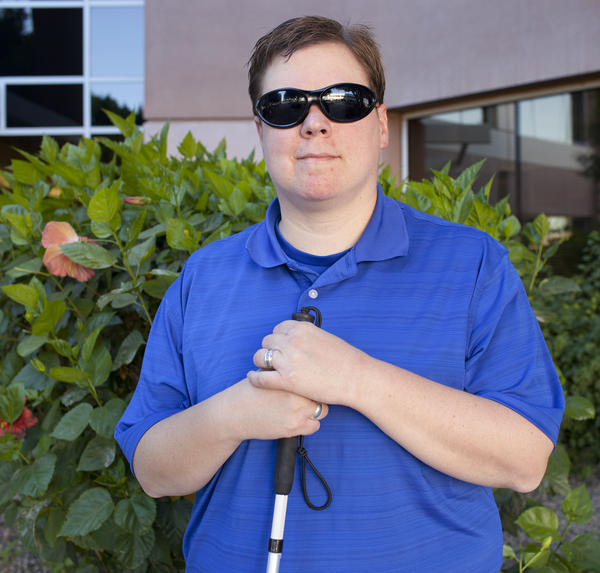
I am still in progress of learning about living with visual impairment.... read more »
I have always been fascinated by adjustment and family dynamics. This project allows that piece to be explored in a fun and non-threatening way. I’ve always wanted to be able to talk to the community, because I’ve always thought that if I can’t talk to the community then it’s never going to change.
The hardest part has been to try and explain my emotions about it. I’m not good at passively dealing with difficulties, but this situation is beyond my control. So, I’m not sure why to bother talking about it. When I was in junior high at a new school—everyone tried to be helpful, but I didn’t want their help. I wanted to do things myself and not be different. In my twenties I realized that I needed some help, but didn’t know how to ask. I realized that I had been going through the same thing when I was in junior high. My mom once held me and said, “I don’t know how to help you, but I want you to know I’m here.”
I’m not sure other people would think it’s funny, but at this point in my life I find other people’s reactions hysterical as I walk toward them with my cane. When I was younger, I might have just gotten upset. The thing that’s made it become funny is that I’m comfortable with my own situation.
Education:
B.S. in Religious Education, with minors in sociology and psychology
Master of Arts, Teacher of the Visually Impaired and Masters in Orientation and Mobility (children)
Education and Work plans:
Thinking about a Ph.D. in Physical Therapy
Vision:
Aniridia (underdeveloped iris), nystagmus (involuntary, often rhythmic eye movements), As a baby I had strabismus muscle surgery (to correct eye misalignment). I also had cataracts (cloudy lenses) removed and now have IOL’s (intraocular lenses), I also have scarring on the macula (area of retina specialized for detail vision) in my left eye
After cornea transplants, I had stem cells implanted around both corneas. My right eye stayed fairly clear (20/200). In left eye, the cornea was more scarred
Current Acuity:
right 20/300 left 20/400
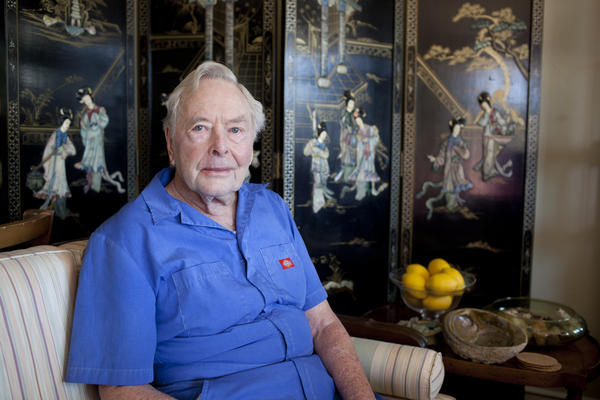
I discovered mine about 10 or 12 years ago read more »
I had trouble seeing letters on paper and they decided it was macular degeneration. After we came to Arizona I got a couple shots in the eye. There were a couple of tears in the eye, a hole in the macular the doctor repaired that but I still can’t see out of the left eye very well. The right eye I can see forms I can see your face I can see your eyes but I can’t see the color of them. I can see the color of your blouse from a distance. At 150 feet I can see the form of that house but I can’t see the details of the roof and I can’t tell whether they’ve got a car or not. And colors are troublesome from that distance too. For example, whites and yellows and grays kinda blend together. And if I’m looking at TV I can see the forms of people but I can’t see the details. If they’re opening a box or something I can’t see that. (interviewer: Can you see any expressions on people’s faces? ) No, but I can see if you’re smiling or not. I can write something down but I can’t tell what I’ve written. I’m taking leutin vitamins to help stall the degenerating process.
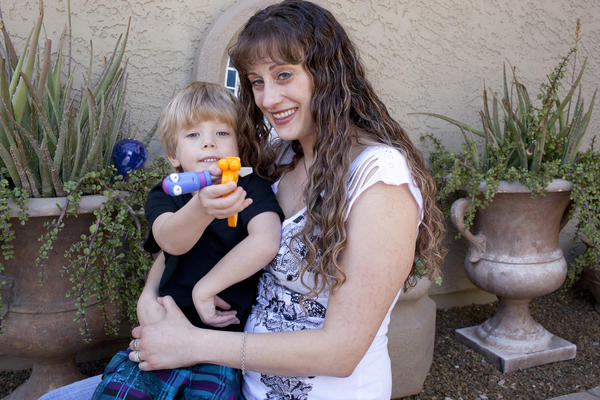
It has been a blessing to be blind.... read more »
I wasn’t making good decisions. Vision loss plus the birth of my son helped me start making better decisions—I became a better judge of character.
I lost my vision about 7 years ago—hardest part is not being able to see facial expressions. Can’t drive. Sad that can’t see my son’s face, but I don’t dwell on it.
I became a diabetic at 10 and decided to live hard because I thought I was going to die young. I became heavily involved in heroin, meth, everything except alcohol. I prayed to God to make things change. I went blind and thought that was a punishment. When I found out I was pregnant, from the first time I heard his heart beat, I changed it all—I’ve been clean for 5 years.
When I was 14 years old I started using drugs. I continued using them for 15 years and it was a horrible lifestyle. I asked God to do whatever it took to help me and He did. I soon became blind. I didn't realize He was answering my prayer. I thought He was punishing me. I continued to pray for help. My prayer was definitely answered when I got pregnant.. The first time I heard my son's heartbeat, I knew everything was going to be all right. Because I was blind I could not see to use drugs. And now I had someone to take care of and change my life for. This March I will be clean for 5 years, and now I have a beautiful 4 1/2 year old son. I feel very blessed to have gone blind. I'm a better judge of character. Now when I meet people I judge what comes out of their mouth and not their appearance. I see you for who you are. I don't see my blindness as a burden I see it as a blessing
I want the world to know that it’s about your perspective. If you look at it as a negative, it’s negative—if you look at it as positive, it’s positive. It’s up to individual to find the positive. I see better now that I can’t see.
We judge on appearance, but now I judge based on what comes out of people’s mouths, who they are.
Education and Work history:
graduated HS, bartending and waitressing
Education and Work plans:
BEP—Business Enterprise Program through Vocational Rehabilitation to learn to run my own restaurant
Vision:
I have diabetic retinopathy (damage to the retina, light sensitive cells lining the back of the eye, due to vascular changes caused by diabetes), macular degeneration (damage to the area of the retina dedicated to detail vision), and a pituitary gland tumor.
I have 20/400 vision. I have no color vision, contrast only, with no vision in right eye, just a sliver in left eye, as if the lights are out and it’s foggy.
Cone shaped field—dark and foggy. I have just enough vision to make out the shapes but not enough to see the details.
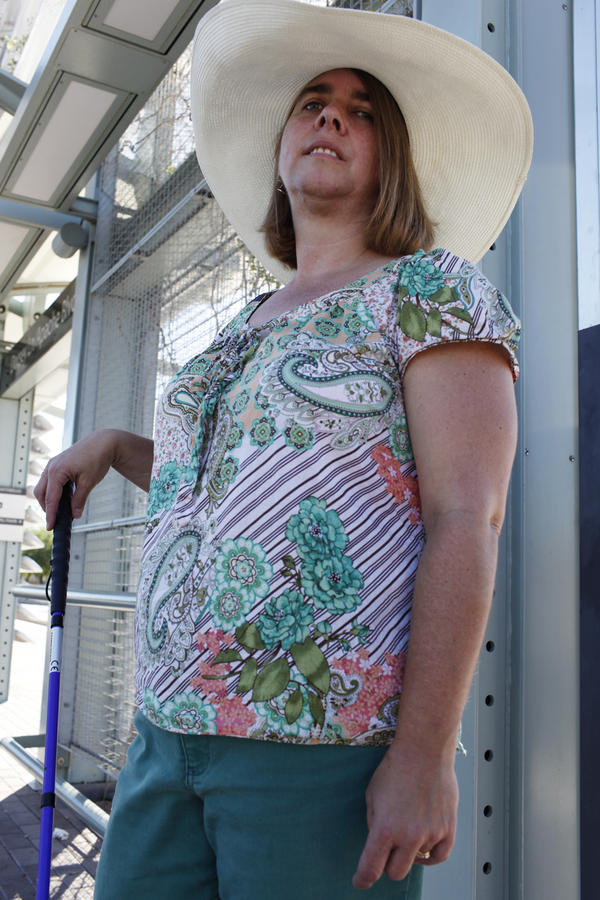
My mother passed away at the same time when I lost the last of my vision.... read more »
I went through a few months of ‘low.’ And then, I got on my face in prayer and got to know God a lot better. I experienced a lot of character building. I’ve had to learn a lot of patience. At different stages, I had to learn self-control but also to get alone in my room and let things out. There had to be a moment, where no one was going to hear, to get things out so it didn’t build up.
I learned that exercise really helps your emotions.
Of course, what’s most in front of me right now is that my family is adjusting at the same time as I’m adjusting to my becoming more independent.
Once, when I still had some sight, I was at a McDonald’s I’d never been to before. I was carrying my tray with food on it. As I walked forward, I saw someone walking toward me, so I stepped to the side. They stepped to the side also and stayed right in front of me. I stepped aside again—and the person followed again. So, I decided to push forward and ran right into the mirror.
Everyone has something to overcome—have the courage not to run from it, but to face it.
Education and Work history:
Graduated high school, one year of college—legally blind in high school, but took cosmetology even though I knew I was losing my sight. I became a shampoo girl at a hair salon. I couldn’t pursue cosmetology as a profession, but was able to be in that atmosphere.
I home schooled my three children through high school graduation.
Education and Work plans:
For 8 years, I was a caregiver for my mother-in-law who was a parapalegic. One of my work goals is to work in home health care. I love the administrative as well as the caregiver side of home health care. I’ve talked with three health care agencies and they are very open to hiring a blind person with experience. At SAAVI, I am learning all the computer skills to get ready to take the Nursing Assistant certification tests. I plan to graduate SAAVI in March 2014—we will be planning the best timing for starting my certification classes.
Vision:
I have Retinitis Pigmentosa (a hereditary, progressive disease that causes the retina, a layer of light sensitive cells lining the back of the eye, to degenerate. Most often, people with RP lose peripheral vision first resulting in ‘tunnel vision.’ Sometimes RP causes total blindness.) I am blind.
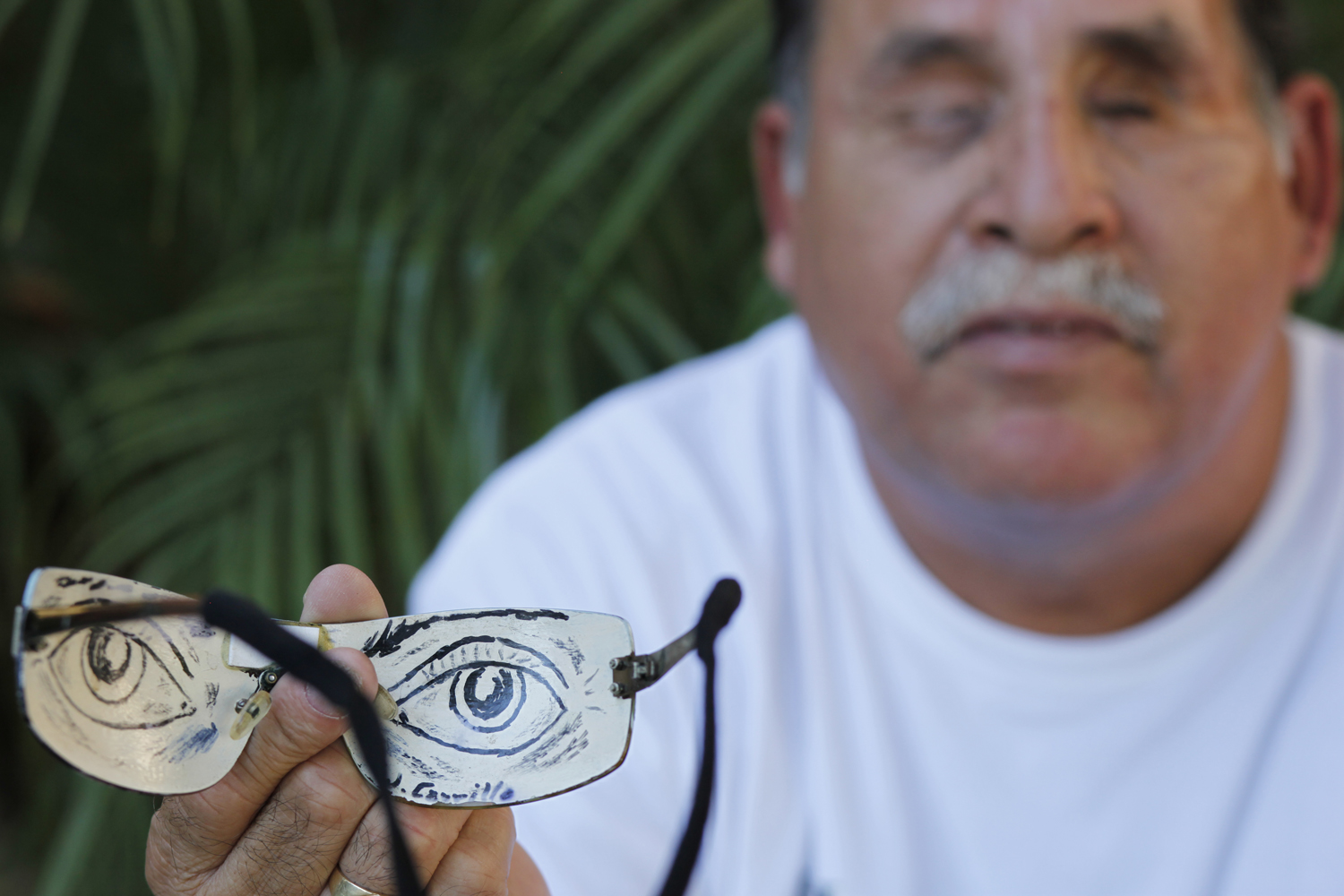
I was repairing brakes on a car... read more »
...not to get paid but because I was doing the repair as a favor. Thugs took my tools and I should have known to let it go but I was being brave, They shot me in the head. It went bad for me, but the guy lost his life—shot by the police. He was wanted for murder.
The story has to start from a sad point. It was sad the first week after coming out of a coma. I thought I couldn’t see because my head was covered up with bandages. I had a trach. My mom would hold my hand and talk about the blood under my nails. I could hear, but I couldn’t respond. When they took my bandages off, I realized something was bad, and they told me I wouldn’t be able to see unless I went to a specialist. I had to write my answers, “I will look like kukuy.” (boogeyman) I kept my sense of humor. When my mom, dad, and sister would come to visit at the hospital, I would tell the nurse, “here comes my mom and dad.” The nurse couldn’t figure out how I knew, but it was because my dad wears a ring of keys. My sister said, “Well your brain’s all there.”
I didn’t have a cane, so I asked for a broom. I didn’t get a cane until about a year later.
The best thing that happened to me was when I went home, people came by and wanted to visit. I told them not to come over and cry on my shoulder. My mom realized I was the same. I started to do my own laundry. People came to visit, but I let them know not to feel sorry for me.
Take care of your vision: safety precautions for people on the job—safety glasses.
Diabetics lose their vision and then feel bad. I care for the world and I want them to take care of their eyes. Your vision is the most important thing after your heart.
I know a friend of a friend who is losing his vision. I told my friend to bring him over and we can go for a walk to the park. Important that he gets out and not stay home.
The message is, “Let’s look out for one another.” You can still have that courage to tell someone, like that movie “George of the Jungle,” “look out for that tree.”
We should make a play—like the Muppets—find a place we can do a show.
Education and Work history:
I’ve done construction work, upholstery, and heavy equipment operator. I worked on the freeways around Phoenix. I poured a lot of concrete.
Education and Work plans:
Hopefully I can get a job—my goal is to get a job and continue life as a normal person with a vision defect. If that doesn’t go well, I’m not afraid to go to school. It will be nice to learn new things. Technology is so important.
(At the time of this interview, Fernando was planning to graduate from SAAVI in January 2014.)
Vision:
I can't see anything.
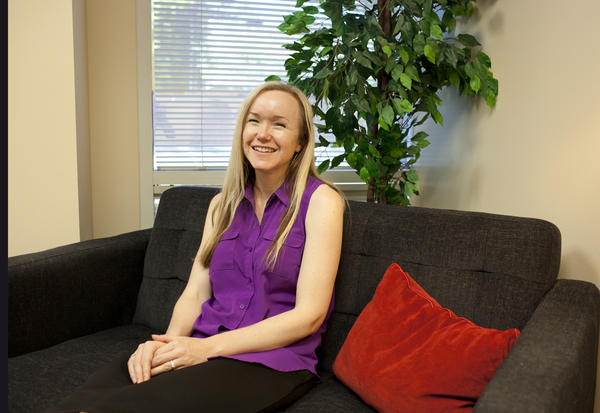
As a child, I was diagnosed at age three with a visual impairment... read more »
....but the actual diagnosis was uncertain. This is such an interesting question because I have been asked about my visual diagnosis a million times, but still am hesitant about quite how to respond. I recall going to various doctors and having extensive testing done when I was very young. At some point there was a consensus that I must have Retinitis Pigmentosa (a hereditary, progressive disorder that causes degeneration of the retina, the light sensitive cells lining the back of the eye). This is what I believed until I was in my early thirties and was given a different suggestion from a new retina specialist. He felt confident that I had been exposed to Rubella in utero. I keep wondering if another diagnosis will find its way to me in the future.
I am legally blind (Legal blindness is defined as having best corrected visual acuity of 20/200 or less in the better eye; or a visual field limitation such that the widest diameter of the visual field, in the better eye, is no greater than 20 degrees) and I do have some usable vision. My eyes are very much affected by lighting. Too much light is painful for my eyes and too little light is a problem because I am night blind. My eyes, like the rest of me, are very particular. I have little depth perception. There are times when I can see stairs and other times when they can appear to be a completely flat surface. The issues with lighting and the lack of depth perception are two main reasons why I use a cane. It is a safety issue first and second, of course, the cane is a great identifier to the public that I am blind.
Because I was diagnosed as such a young child, I think the most difficult aspect of vision loss for me was growing up being different from other kids. In the same breath I have to recognize that this also is probably the thing that I am most grateful for now. Growing up “different” than others was difficult, but it also taught me how to empathize with others who are different. I learned how to think outside of the box and developed coping skills that have led me to be the person I am today. I believe most certainly that my experience of vision loss led me to choose my career path. This loss in general taught me that it is up to me to decide my fate regardless of what anyone else thinks about me.
Sadness is of course a factor when thinking about any grief process. I do not often feel sad anymore about losing vision. Again, I think I grieved that a long time ago. However, the one thing I think would be awesome is to see the stars. This is about the only thing that has always stood out to me as being something that would be an amazing thing to actually see visually.
It is funny how often people mistake my cane for other things. This makes me laugh because sighted people are supposedly able to observe everything with their magic eyes right? Well, in the past fifteen years or so, my cane has been mistaken by sighted people as: a hiking poll, a pool stick, a nondescript weapon, and a reaching tool that a sales girl would use in store. Classic!
For people who just found out that they, or a loved one, are losing their vision, I would tell them that they should feel however they want to right now about their vision loss it is a grief process which is made up of many messy moments and I would encourage them to experience those emotions authentically. I would want them to know that there is great hope even though it may not feel like that right now. This is just another life transition that you can choose to move through in whatever way you want. If you decide that you are going to move through this initial grief period and into a place of being a happy, successful person who happens to have a vision loss then you will do exactly that. Your vision has diminished, but not your strength and control over your life.
Living with loss of sight is just like living with any other type of loss. For a while it is hard, and then it becomes normal. This new normal can often be even better than how life was previously because people tend to grow and change so much during this process. Many times people end up becoming more comfortable in their lives then they ever have been.
One thing that would help people understand my experience would be reading the award winning book that I plan to write about my adjustment to vision loss. But until I write that and get it published I would say that it is difficult to understand this experience without talking directly to the person. When someone is visually impaired it is hard to offer a realistic simulation to show others exactly how you see the world. Everyone with low vision has such different degrees of what they can see that it is nearly impossible to create a way for others to really have the full experience. I definitely feel that everyone in the world has a unique experience in life and reading about their life or talking directly to them is my preferred way to learn.
I am interested in what I can share with others about my experience. I am especially interested in reaching those who have recently become visually impaired or blind themselves.
The most important thing I have learned is that I will define my own potential and limits. No one else can define that for me through the lens of their prejudice, misunderstanding or fear.
Education and Work History:
I have a BA in psychology from ASU and an MS in Marriage and Family Therapy from San Diego State University. I have mostly worked as a counselor in the past, but also had several years of experience working at ASU in the Disability Resource Center. For the past eighteen months I have been working at SAAVI. My current position is Coordinator of Supported Education.
Education and Work Plans:
I have no specific plan other than I want to be open to new opportunities. Earning a PhD would be an amazing adventure, so I am certainly open to going back to school, but have not yet found the right program that feels like a fit for me.